Wes Moore may be the surrogate Biden needs to win back Black voters – and panicking Dems
FAYETTEVILLE, N.C. – Olaf El hasn’t felt this inspired in a long time. But Maryland Gov. Wes Moore pulled him in.
The first Black person to win the governor’s mansion in his state. The third Black person to be elected governor in the country, ever. An Army vet. A successful author. And he’s only 45.
Like many young, Black voters, El says he backed President Joe Biden in the last election. But it's the “the younger generation” he wants to hear from now.
So, he drove a half-hour from Lilington, North Carolina, in mid-June to watch Moore, an official Biden campaign surrogate, speak at a veterans' event in support of state attorney general Josh Stein, the Democratic gubernatorial candidate.
An impassioned Moore spoke about leadership, patriotism and freedom for people to feel safe. “We are going to invest in the remarkable men and women of law enforcement, and we are going to invest in the communities that they live in and exist in,” he said. “Because we are not going to make a choice.”
El went from being open to Stein’s message to saying he’d probably volunteer. Just think, if Biden, he said, were appearing with Moore.
“We supported him with the expectation that he was going to pass the torch,” El lamented at the Stein event, which took place prior to last week's presidential debate. “I wish he would have stepped down. We could have had a new primary, and we would have been able to reenergize the base.”
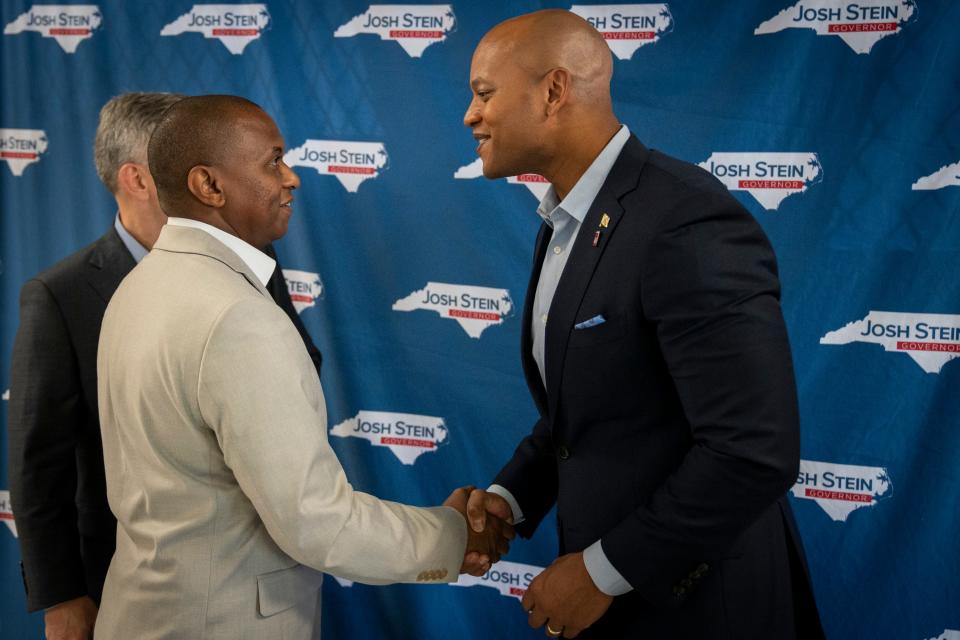
Biden’s reelection bid hinges on getting voters like El reengaged in the national political process: unenthusiastic Democrats, world-weary African Americans and detached millennials. They’ll help him topple presumptive Republican nominee Donald Trump, but it’s an uneasy allegiance, and they’re more willing to listen to the rising stars in the party that Biden said he would empower.
“I think like me, people are waiting for the next generation of Democrats,” said El, a 37-year-old public utilities worker, who’s running for his local school board.
Those prospects became more daunting after Biden's debate fiasco: Just 51% of Democrats said Biden should remain on the ticket in a USA TODAY/Suffolk University poll. Campaign officials spent the weekend reassuring supporters and donors Biden can still win the election.
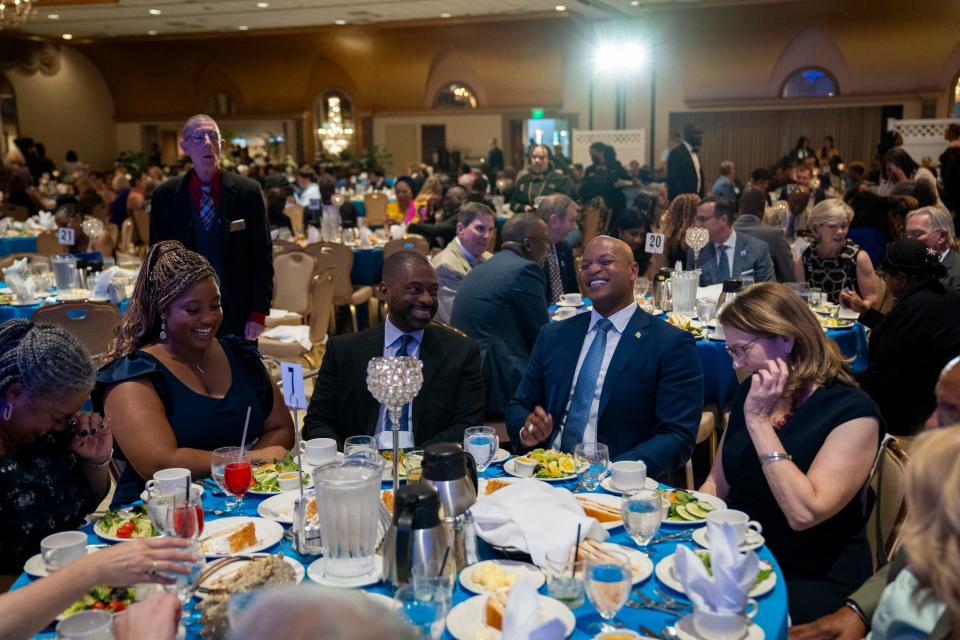
USA TODAY traveled with Moore weeks before the debate. During the trip, Moore keyed in on the nostalgia that voters have for the hopeful message of former President Barack Obama, which Biden has himself tried to play off.
Moore sees a cynicism in the Black community toward politics that he says is not about Biden.
“It goes back to the fact that there have been policies that have been put in place that have, in many cases, intentionally harmed the African American community,” Moore said in an interview with USA TODAY.
The married father of two has big ideas that he has sought to execute with his party in control of every major statewide office and the Maryland Legislature.
Moore, who was elected less than two years ago, said as a candidate that he was not about raising taxes. And so far, he has been able to avoid painful hikes.
He has pressed forward with promises to act “aggressively” on gun violence, signing legislation his first few months in office that prohibits most individuals from wearing, carrying or transporting firearms in crowded areas. In May, he announced the creation of a gun violence prevention center that mimics the one Biden opened at the White House.
“Everybody likes to put, oh, he's the next Obama. No, he's the next Wes Moore,” said Democratic National Convention chair Minyon Moore, a former Biden adviser who is friends with the Maryland governor.
Just last month he directed his administration to come up with plans to achieve 100% clean energy in Maryland by 2035 and made good on a pledge to look at expunging cannabis convictions. Maryland legalized weed on the same night as his election; in June he issued a mass pardon for 175,000 low-level marijuana convictions.
“He's not afraid to step out and do the work and do what he knows the people in Maryland want him to do,” former Maryland Democratic Party Chair Yvette Lewis said. “And that, I think, is why he's been so successful in his first term.”
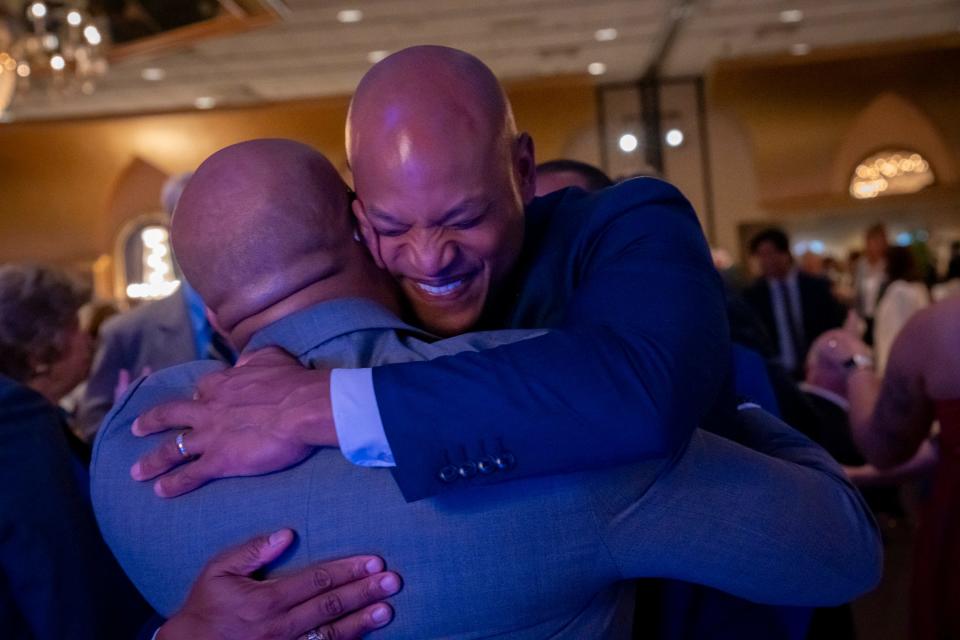
Newcomer to Maryland politics
“I told him not to run,” entrepreneur John Hope Bryant recalls.
Moore was leading Robin Hood, a New York-based, anti-poverty nonprofit. He sought the counsel of Bryant, a fellow entrepreneur and bestselling author.
Bryant worried that Moore’s insight, authenticity and integrity would not be appreciated, and his friend would be chewed up and spit out. Why not become a businessman. He could hire people, create jobs and generate some wealth for himself. “I tease him every time I see him – I’m so glad you didn't take my advice,” Bryant said he tells Moore now.
Moore beat back allegations that he exaggerated his early ties to Maryland – where he lived as a small child but his family left after tragedy struck – to emerge victorious over a large primary field that included former U.S. Labor Secretary Tom Perez, now Biden’s head of intergovernmental affairs.
He won the general election with a mandate of more than 30 points.
He took the Oath of Office on bibles owned by Frederick Douglass, an escaped slave and fellow Marylander, and his grandfather, who he says was the first Black minister of the Dutch Reformed Church. Even Oprah Winfrey spoke.
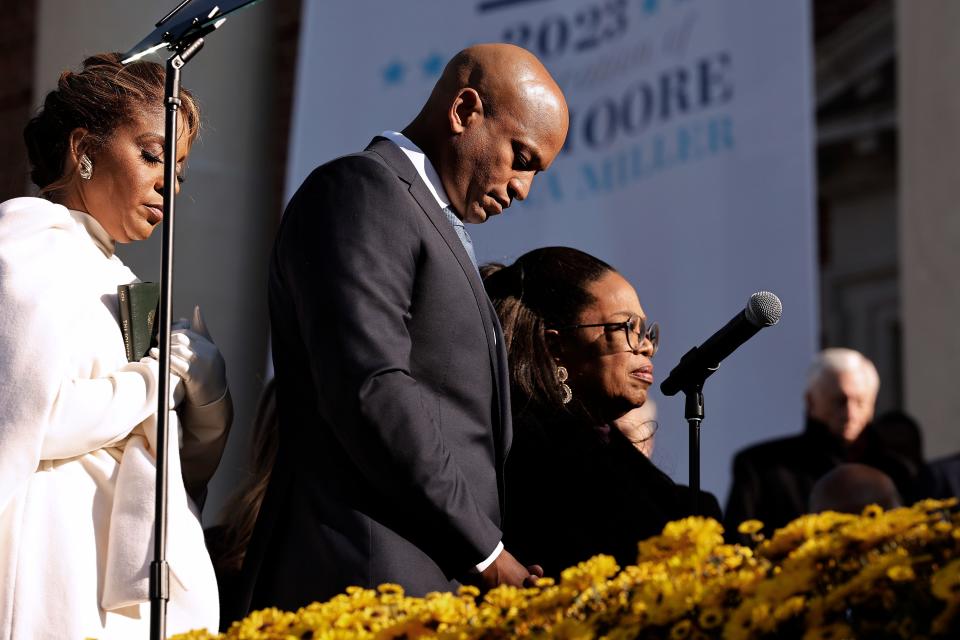
It was a remarkable turnaround for Moore, whose father died in front of him when he was 3. After his death, Moore’s mother moved the family from Maryland to New York City.
He struggled as a boy and found himself in handcuffs at 11 after he got caught spray-painting a Bronx business. (His tag was KK with a circle around it for Kid Kupid, a nickname he says he gave himself.)
At 13, Moore was sent to Valley Forge Military Academy and College in Pennsylvania.
His time there changed him. Moore told USA TODAY he found he liked the responsibility and the chance to be a part of a team. “The military in so many ways helped to save and helped to shape me.”
Moore attended Johns Hopkins University in Baltimore. There, he played football, became a Rhodes Scholar, pledged Alpha Phi Alpha and studied international relations.
In the years that would follow he’d work as a White House fellow, under then-Secretary of State Condoleezza Rice, on Wall Street as banker and eventually at a nonprofit, before he was elected Maryland governor in 2022 with Obama’s support.
Maryland Rep. Steny Hoyer, the former U.S. House majority leader, had not originally planned to endorse in the Democratic primary for governor. But he changed his mind after watching Moore.
“I saw in Wes Moore a person who was uniquely skilled and a person who could motivate people, inspire people,” Hoyer said.
Anywhere, everywhere – all around the country
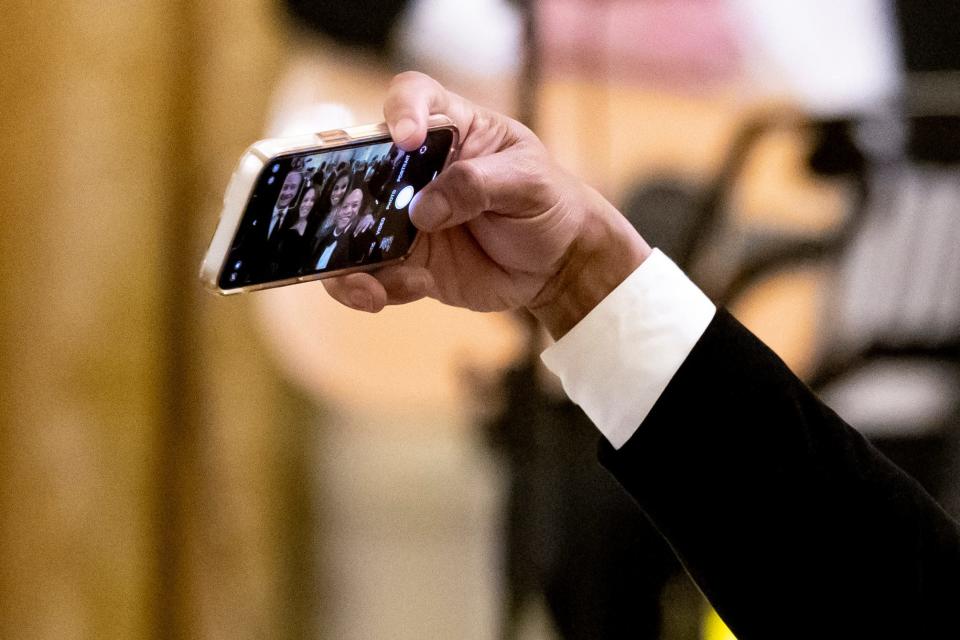
No matter where Moore goes, he’s often rushed by people hoping to get a selfie.
Such was the case in Chicago at an Obama election anniversary celebration last year.
“He couldn't take a step forward, because every hotel staffer kept stopping him with that kind of rockstar feeling,” Patrick Gaspard, the political director for Obama’s campaign and a Moore donor, recalled. “Wes has that thing. That thing that you can't define, that you can't teach, you can't transfer.”
It happened again at a Maryland Democratic Party event in May to support Prince George’s County executive Angela Alsobrooks in a hyper competitive Senate race against former Gov. Larry Hogan.
One of the most requested Biden campaign surrogates, Moore has sought to convert that energy into enthusiasm for the president’s reelection. He did a virtual event for college students in Michigan and traveled to Georgia, Pennsylvania and Wisconsin.
“Gov. Moore is a strong, battle-tested leader for Maryland and a rising star in the Democratic Party," Biden campaign spokesman Charles Lutvak said in a statement.
Lutvak said Moore is a "close partner and a fierce ally" of the president and vice president and "an important part of the team" that's working to elect Democrats up and down the ballot.
Moore’s presence on the trail is seen as especially helpful in battleground states where the president’s support among Black voters is sagging.
Gerald Griggs, an Atlanta-based civil rights attorney, said Biden needs someone like Moore, a fellow Alpha, on the ground speaking to Black voters unwilling to accept politics as usual.
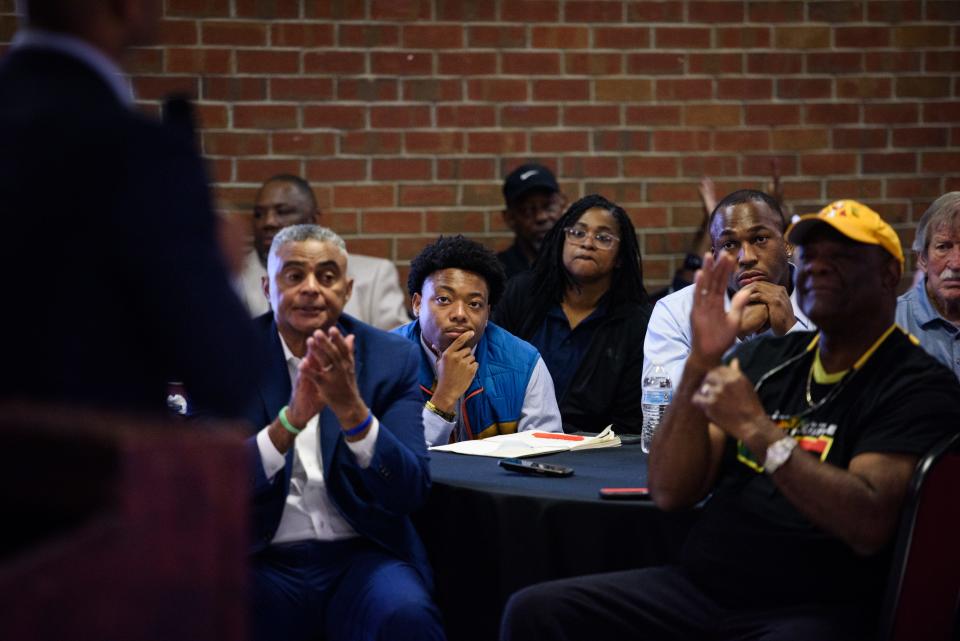
Some of Biden’s promises on student debt and investment in Black communities have been met. And the appointment of the first Black woman to the Supreme Court is appreciated. But there are other executive actions Biden can take, he said.
Whatever happened to the pledges to protect voting rights and enact policing reforms?
“He can do more,” said Griggs, the head of the Georgia NAACP, speaking in his personal capacity.
Biden and Harris have begun visiting Georgia with a new ferociousness. Biden gave the commencement speech at Morehouse College, a historically Black university in Atlanta.
The president returned last week for the debate. Since the end of April, the vice president has visited Atlanta three times.
In an interview, Moore said he long respected Biden. He says they first met in 2017 when he interviewed Biden about his book, “Promise Me Dad.” He plans to keep hitting the trail for Biden.
“I will be anywhere and everywhere that the candidate would like me,” Moore told USA TODAY during a roundtable for reporters in March. “We’re going to be going … all around the country.”
Then, the bridge collapsed.
Tragedy strikes in Baltimore
Just after midnight on March 26, a cargo ship lost power and crashed into the Francis Scott Key Bridge. Multiple cars and six construction workers plummeted into the depths of the Patapsco River.
Moore’s phone rang at 2:02 a.m. He declared a state of emergency and ordered a search and rescue operation. The White House called at 3:30 a.m.
Having learned the lesson of an apparent absence during a train derailment in Ohio earlier in his term, the president sent Transportation Secretary Pete Buttigieg. A week and a half later, Biden personally visited.
Moore stressed Biden’s invaluable support. But more than anything, the episode tested his mettle.
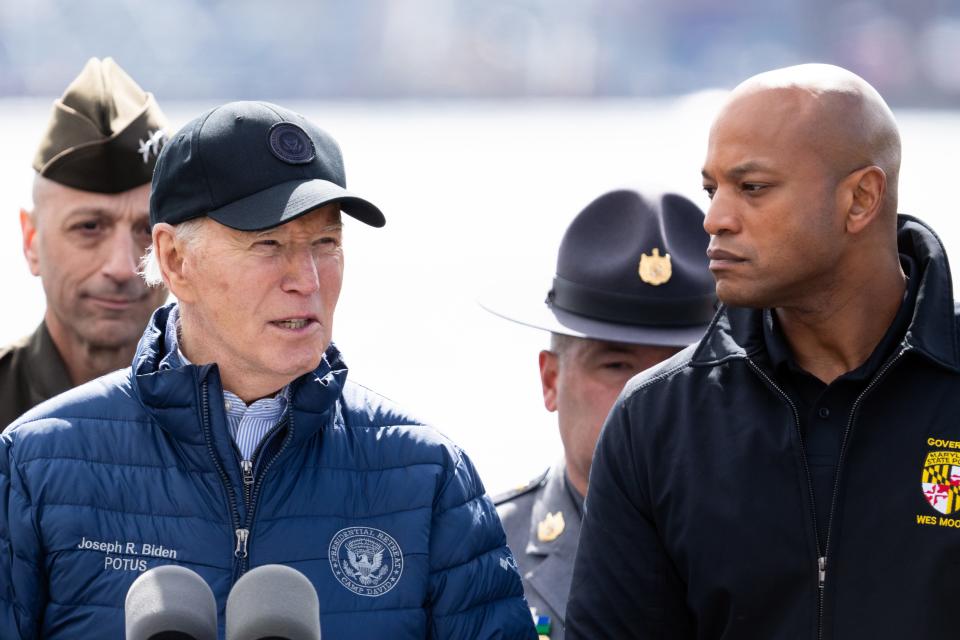
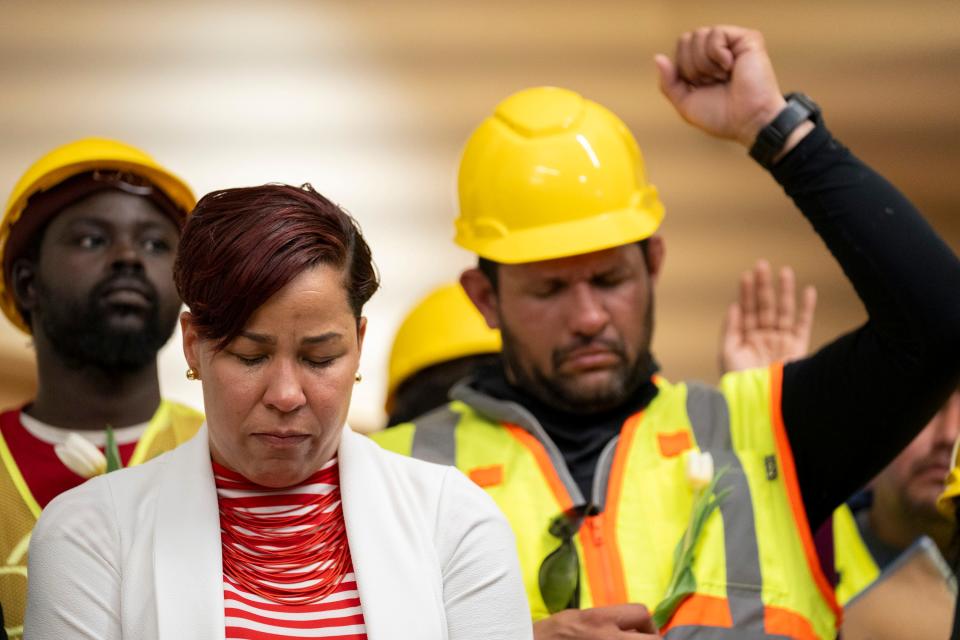
Moore was up before dawn. He was on the job when the sun set. He attended in-person briefings at Unified Command and briefed the press. He visited victims and did boat tours. He took first responders and police officers who rescued people on the bridge to Opening Day at Oriole Park. Moore spoke to Biden nearly every day.
After a handful of Republicans attacked Baltimore Mayor Brandon Scott and blamed diversity, equity and inclusion initiatives for the bridge collapse, a very-exhausted looking Scott hit back hard. “We know what they want to say, but they don’t have the courage to say the N-word,” Scott said in an MSNBC interview.
Moore refused to be drawn in. Asked on CNN whether it was racism, he said getting closure for the families of the missing, keeping Maryland’s first responders safe and reopening the shipping channel were his priorities. He did “not have time” for anything else.
“The bridge falling down was a perfect example of his ability to organize,” Hoyer said. “He set up a command center, part of his military experience, of course, but also his military leadership.”
He met with Republicans and Democrats on Capitol Hill about funding and invited a bipartisan group to visit Baltimore.
“The tireless effort and teamwork I saw today is the American standard,” Arkansas Republican Steve Womack said in a statement after the tour.
His precision paid off. Less than three months later, the Fort McHenry channel fully reopened. “Many said it would take multiple months for us to get to this point,” Moore said. “Instead of 11 months, we got this thing done in 11 weeks.”
A brief but impactful stay in North Carolina
Moore calls a few places home. And sometimes it gets him into trouble.
This time, he was referencing a brief period when he was stationed at Fort Bragg before he deployed with the 82nd Airborne.
Those months in North Carolina, he says, helped to make him. And train him. “A place that helped me understand that the difficult takes a day and the impossible takes a week.”
For national Democrats, the last ticket to win North Carolina was Obama-Biden in 2008.
Biden lost by just 1.3% and has been aggressively targeting the state. He’s done radio interviews with Black media, hired 60 staffers there, with plans to double it before Aug. 1, and thrown millions at the problem.
North Carolina was Biden’s first stop after last week’s debate against Trump. He’s sent the vice president down five times this year, too.
Democrats think Biden has as good of a shot at winning North Carolina as Georgia, where Biden was boosted in 2020 by Ebenezer Baptist Church pastor Raphael Warnock’s presence on the ballot.
To win, Biden needs to reverse a trend of registered Black Democrats sitting out elections. It’s a problem of attrition, among young Black men in particular, and it’s hurting Democrats in the state up and down the ballot.
Second vice chair of the state party Kimberly Hardy has been on a 30-county listening tour trying to fix the issue. She said the response has overwhelmingly been: Elected officials are going to do what they want anyway.
The Biden campaign and its surrogates have to visit more places like Fayetteville and Wilmington, Hardy said.
Biden did go to Wilmington. And Moore was in Fayetteville in June. But while he was there, he did not explicitly campaign for Biden.
The only time the presidential race came up? When reporters pressed Stein on whether he wanted Biden there.
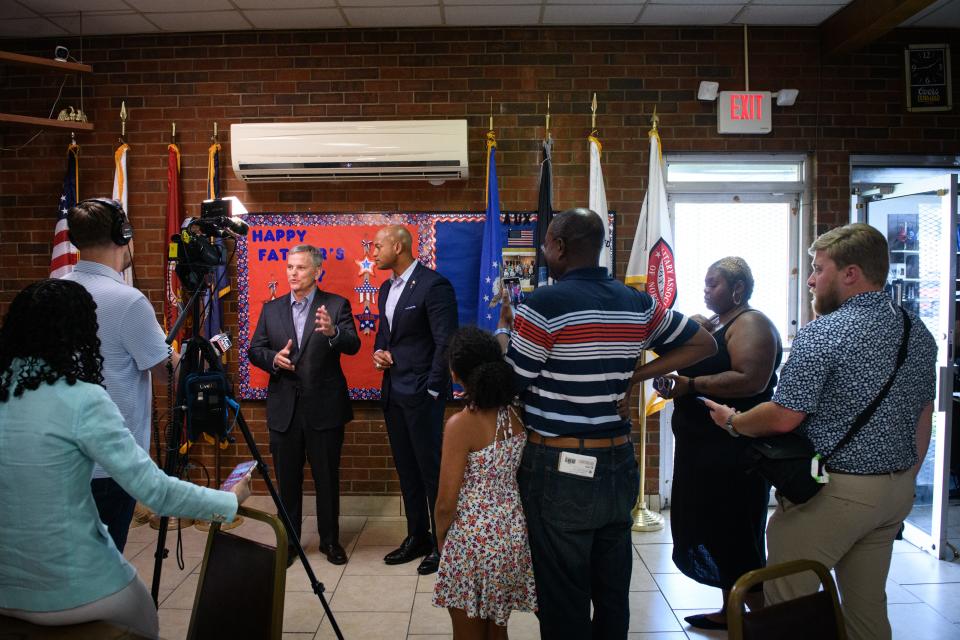
Democrats brushed it off. Moore was in North Carolina to campaign for Stein in his race against Lt. Gov. Mark Robinson and raise money for Democrats. During his interview with USA TODAY he talked Biden up.
But the episode highlighted the conundrum Democrats – even those who have been tapped by Biden – have faced on the campaign trail: The president could be a down-ballot drag.
Stein did not share the stage with Biden on Friday at a rally that took place as Democrats across the country were melting down.
Moore was hopeful his presence would fire up voters to cast a ballot for both Democrats.
There was some anecdotal evidence it was working. When Cynthia Peters, 74, a retired government worker and Air Force veteran, opened her email and saw Moore would be joining Stein, she knew she had to go.
She’d seen Moore on television. “I think he’s very intelligent. I think he’s very vision focused. I just think he’s a great governor,” the Goldsboro resident said.
Peters said she supported Biden in the last election and would again. “He’s very empathetic, he’s very sensitive to our needs and our wants. He’s more human to me, like my neighbor or somebody,” she said of Biden.
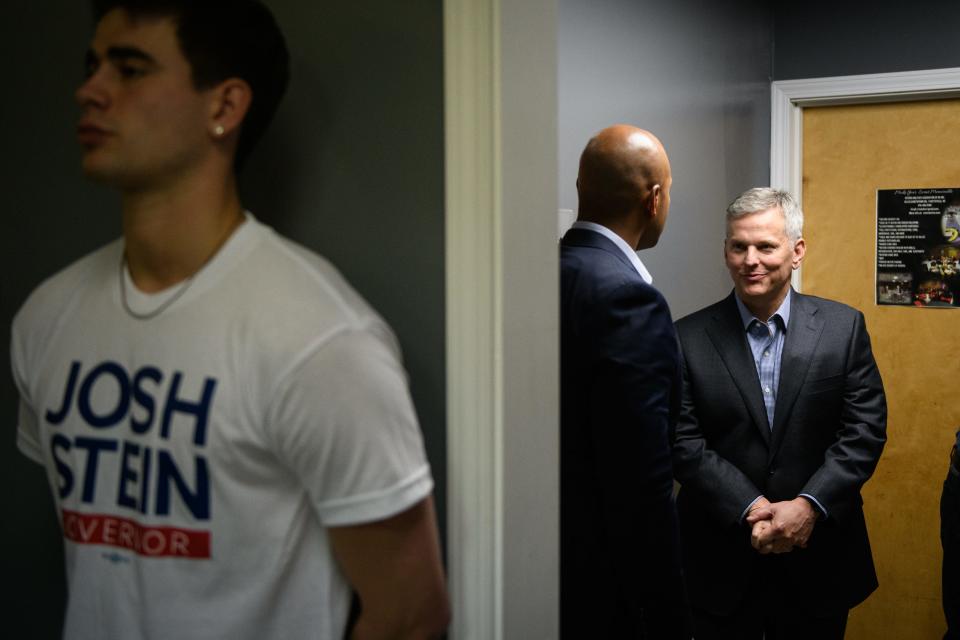
Democrats want more of Moore
Moore was in the final stretch.
“I'm thankful that even though I'm the governor of Maryland – I know none of y'all can vote,” he said.
Laughter filled the room.
Retired marine Tim Dunn hollered from the back: “We will soon.”
Dunn, 63, saw Moore on TV after the bridge collapse. Instantly, the Fayetteville resident was a fan. “He did a phenomenal job, and I said, that young man’s going somewhere,” he said.
Moore has long been floated as a future president. Even before winning public office. He insists he hasn’t thought about 2028. His travel schedule is about Biden and Harris retaining the White House.
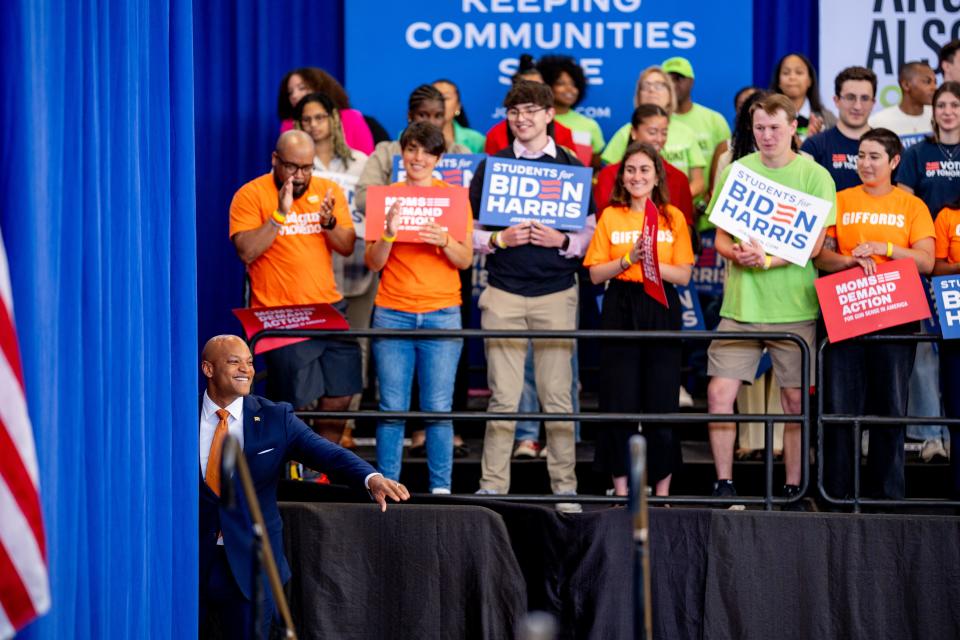
“I'm loving the work that we're doing in Maryland,” Moore said. “And I know that we, I, rely on this partnership with the president and the vice president in order to make that happen.”
Moore’s book brought him national acclaim. His historic election to governor and handling of the bridge collapse has made him even more recognizable.
Although he doesn’t have the same network of political allies as more established potential competitors, the election-year fundraisers and campaign events he’s headlining are helping.
He’s making friends in New Hampshire, which traditionally holds the first party primary, and is expected to campaign for Democrats’ eventual gubernatorial candidate there this fall. He's made inroads in Georgia, a state Democrats are angling to move to the front of their primary calendar.
Moore would not have been able to put so many points on the board if he were looking around the bend at his ambitions, said Gaspard, who was involved in both of Obama’s presidential races.
“Presidential party primary contests are all about the emotion, all about the fire of a moment and whether or not you can catch lightning in a bottle because your personality is meeting the moment in some meaningful way,” Gaspard, currently CEO of the liberal Center for American Progress, said.
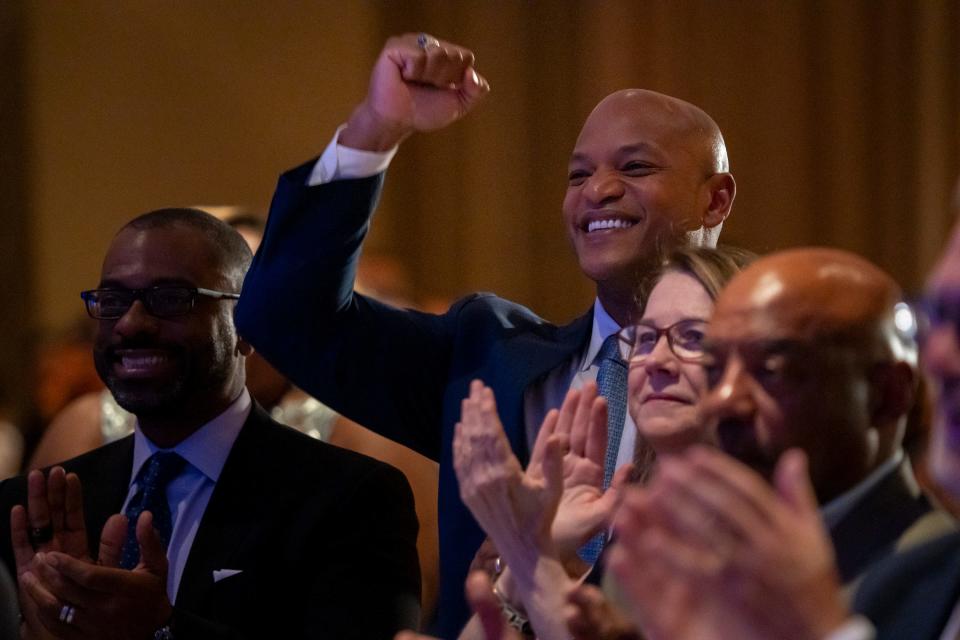
Moore is certainly having a moment. But can he capitalize on it?
He will be up for reelection in 2026 and would have a short runway to launch a presidential bid.
“Let me tell you what I've told him. I suggested, be the best governor you can be over the next four years. The future will take care of itself,” Hoyer said in an interview. “Do I think he could be? Yes, of course. And everybody thinks he could be.”
Moore, the party’s convention chair, said the governor was one of the people whose counsel she sought when she was appointed to the role. “He has good insight, good vision, and he sits at the precipice of where we are with young America and old America.”
He could find himself facing off against other Black Democrats with their own set of political firsts.
Harris sought the presidency in 2020 and is widely expected to run again. Biden all but endorsed her ambitions in May, when he told a group of grads a Morehouse man will one day be president – but not until after an Alpha Kappa Alpha from Howard.
Warnock, the first African American senator from Georgia, is a Morehouse man. Harris attended Howard.
Harris’ sister, Maya Harris, has given to Moore repeatedly, including last August, after he had already been elected, records on Open Secrets show.
Moore and the vice president have worked closely together on gun violence prevention. In an interview, Moore called her an “extraordinary” friend.
“I'm so committed to her success,” he said. “And I'm committed to making sure that she gets another four years.
For now, Moore is putting the blood, sweat and tears of his military training in Fayetteville to work in 2024. “They taught us something: every day, earn it. Every day, earn it. Nothing given, everything earned. And we have the chance to earn something special, if we're willing to put in the work.”
It’s that kind of discipline he will need.
Francesca Chambers is a White House correspondent for USA TODAY. Follow her on X, formerly Twitter, @fran_chambers.
This article originally appeared on USA TODAY: Can Wes Moore end Democratic panic over Biden and lure Black voters?
